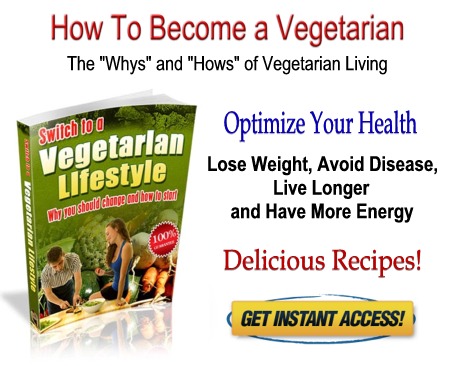Balanced Vegetarian Diet
Many people start vegetarian and vegan diets without doing nutritional
research and learning what constitutes a balanced vegetarian diet. Consequently, a considerable
number of new vegetarians don't last for more than a couple of
months. Happily, achieving a balanced vegetarian diet is
relatively easy once you know the basics.
Many new vegetarians who fail to carefully research and plan
complain that they lack energy. Also, they often experience
a significant loss in muscle mass. Others observe a
number of other problems that come with a poorly balanced vegetarian diet.
The first group -- the group that most failed vegetarians fall
into -- is usually experiencing a form of protein-energy
malnutrition (PEM). PEM emerges when a person fails to
consume enough high-quality protein. This often leads to muscle loss
accompanied by feelings of weakness as well as head and muscle aches.
PEM can be circumvented by designing a balanced
vegetarian
protein rich meal plan.
A vegetarian who is experiencing PEM should do one of the following:
-
Learn what foods
contain complementary amino acids so they can be
combined to form complete proteins.
-
Consume
larger amounts, from more diversified sources, of vegetarian protein. Tofu,
soy milk, and yogurt are excellent choices.
This group is often iron-deficient as well. Because
vegetarians can only consume non-heme iron (which
is more sensitive to iron inhibitors) they often do
not consume enough to maintain healthy blood-iron
levels. This can cause pervasive weakness and
even anemia.
Most nutritionists suggest that vegetarian and vegan
dieters consume roughly twice the recommended amount
of iron while greatly reducing their consumption of iron
inhibitors.
It may also be a good idea to supplement a balanced vegetarian
diet with iron supplements.
People in the second group, who suffer
from a range of other diet-related problems, are
often not consuming enough of the nutrients that they unknowingly consume on a diet that includes meat
and dairy products. These nutrients include
zinc, calcium, vitamin B12, vitamin D and riboflavin. With the possible exception of B12,
these can often be consumed in adequate quantities with a
carefully balanced vegetarian
diet.
A daily
full-spectrum vitamin and mineral supplement is probably a good
idea for most vegetarians, especially those who don't consume
dairy products.
To guard again
pernicious anemia (symptom-less until irreversible damage is
done), vegetarians who don't consume dairy products or eggs (and
some who do) should supplement with B12.
Sublingual B12 is absorbed the easiest, although some people
require injections, as oral supplements may not be absorbed in
high enough quantities. It's a good idea for new vegetarians
to consult their physicians after the first 6 months to have
nutrient levels measured (especially B12 and iron) and to discuss possible absorption
issues.
Some recent studies have suggested that vegetarians
process certain types of foods with less
efficiency because they consume different amounts
and varieties of absorption inhibitors and enhancers. However, research
shows that
a balanced vegetarian or vegan diet, when done right, is not only as healthful
as a non-vegetarian diet, but
is also much more heart-healthy. A balanced vegetarian diet usually
contains higher amounts of antioxidants, also.
In order to eat a
healthful, balanced vegetarian diet, it's important to put in the
time to research and plan. Otherwise, it's very likely you
will develop one or more of the nutrition deficiencies discussed above.
Once you learn and implement the basics, a balanced vegetarian
diet can be very healthy for the long term.




